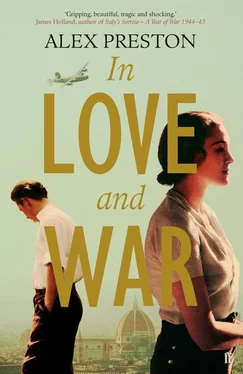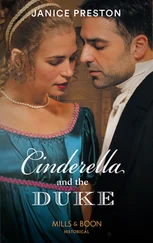Now, shrugging out of his embrace, she lifts the caftan over her head and stands naked in front of the painting.
‘Like so?’ She poses in front of the portrait of Mary Magdalene, crosses her arms over her breasts and affects an anguished expression. They both begin to laugh. Her hands slip down to rest on the bulge in her stomach.
‘Exactly,’ Esmond says. ‘You’d do for a wonderful martyr.’
‘Not just yet.’
They make love then, slipping beneath the covers of the bed for warmth, burrowing down until their heads are under and they feel themselves lost in a darkness of skin and hot breath. When they are done he throws the covers back and they emerge, gasping, as if they have been saved from drowning. Looking down at her hair flared out on the pillow, he imagines rushing her westwards, to safety, to Spain and then — who knows — Brazil, America, even back to Britain. He sees them in Shropshire together, the presence of the child flitting around the picture like a firefly, illuminating Welsh Frankton, bringing joy to his father’s withered heart.
He is downstairs brewing their orzo when Pretini’s voice comes over the radio. Ada calls down, although Esmond can’t hear what she says above the crackle of logs in the fire. He carries the mugs upstairs, his bare feet cold on the polished wood. As he enters the room, he sees that Ada is getting dressed, pulling on a pair of slacks, leaning back against the cupboard as she wriggles in.
‘They’re raiding the synagogue,’ she says. ‘The Gestapo and the Banda Carità . We need to get down there.’ She takes the mug of coffee and gulps at it. ‘Fuck!’ She winces. ‘Hot.’ Esmond pulls on a shirt and his blue twill suit. He’s about to leave the room when he stops and bends to pick up Bailey’s revolver, which he tucks into the waistband at the back of his trousers. It feels awkward, almost indecent against his tailbone as he comes down.
Ada is already out on the gravel in front of the house, scratching Tatters behind the ear. ‘I said we’d meet Pretini at the Salon at eleven thirty,’ she says. They walk briskly down into the city, which is still for a Saturday morning. The guards on the Ponte Santa Trinità eye them warily, but let them pass.
‘They moved in just after the start of the Shabbat service,’ Pretini says as they enter. ‘They’ve got two hundred of them in holding camps in Santa Croce. They’ll be taken up to the train station tomorrow morning, then to Germany.’ The Professor and Elio are in the salon, bent over a railway map on the floor. Pretini is cutting the Marchesa Corsini’s hair. ‘She’s one of us,’ he says to Esmond, noting his face.
‘And I have a very important party this evening,’ the Marchesa says frostily. ‘I was booked for an appointment last Saturday, but the bastard Carità had me in his Villa Triste.’
Ada stands over the Professor, looking at the map. ‘They’re taking them to the trains?’ The Professor nods. ‘Then we need to act now.’
‘Yes,’ Pretini says, snipping carefully at the Marchesa’s softly waved hair. ‘We stop the trains as they head north.’
‘If we can.’ Elio indicates a point near Pistoia where the railway line curves around the swell of a hill. ‘Alessandro and Bruno are going to drive a truck onto the tracks here. They’ll overpower the guards and stage a rescue. We’ve enlisted help from a group of Czechs who’re hiding out by the Lago di Suviana. A much greater chance of success than if we try to do anything in town. Agreed?’
‘Agreed,’ says Pretini. The Professor nods. Even the Marchesa, with a subtle incline of the head, is in.
‘What can we do?’ Ada asks.
Pretini, standing back to admire the Marchesa’s hair, gives one final snip of his scissors. He removes the gown that protects her Ferragamo suit and bows for a moment, like a man saying grace. Only then does he turn towards Ada. ‘One of Carità’s hit squads has gone to the Ashkenazi prayer house by the Porta Romana. Rabbi Cassuto moved all of the records down there at the beginning of the war. It’ll mean they have the address of every Jew in Florence.’
‘So you need to warn them,’ the Professor says. ‘Those who can should leave. The rest you must take up to L’Ombrellino until we can work out how to make them safe.’
‘Where do we start?’ Esmond asks.
‘We had a call from Professor Rossi at the Bargello,’ the Professor says. ‘He’s been hiding Rudolf Levy, the painter. The Nazis want escaped German Jews more than anything and they know he’s here. Levy and Rossi have been seen together, it won’t be long until they go looking there. He lives at Apartment 18c, via del Proconsolo, by the cathedral.’
‘And when we have him?’ Esmond asks.
‘Get him up to L’Ombrellino and wait for instructions. He might have to stay with you for a few days, until things calm down.’
Esmond’s heart is thumping as they walk out onto the via Tornabuoni. German soldiers march up past the Palazzo Arcimboldi, their feet echoing on the cobbles. Esmond checks the gun in his waistband and hurries to keep up with Ada. She has on the beige tunic she wore the first time he met her, a green cardigan over it. Her hair is still knotted on her head, a nest of dark red snakes.
There are tanks in the Piazza del Duomo. At the sandbagged foot of the Campanile, three Germans are arguing with a Blackshirt. A monk hurries up the steps of the cathedral. Otherwise the square is deserted. Esmond remembers going into the Duomo that drunken night with Douglas and Orioli. Five years, he realises. He barely recognises the boy he sees in his mind, standing in front of Uccello’s portrait of Sir John Hawkwood, swaying with drink, half-hard with lust for Gerald and Fiamma. Ada reaches out for his hand as they come onto the via del Proconsolo and he can feel his pulse against hers. They walk in time to the thud of their hearts.
Professor Rossi’s apartment is on the third floor of a wide building in the shadow of the cathedral. The front door is open and they make their way into the hallway and up stone stairs. Ada rings the bell, Rossi’s name beneath. They wait, breathless. The door opens.
‘You came,’ he says. He’s a short man, bald at the crown. He looks exhausted, unshaven. He loosens his tie with a nervous movement as they enter a gloomy drawing room. The bulk of the cathedral blocks out light in the flat. Everything is bathed in a dim terracotta glow from the tiles on the roof of the Duomo. In an armchair in one corner sits an elderly man, breathing audibly. Behind him, one hand on his shoulder, is a slender woman.
‘Some coffee?’ Rossi asks. ‘It’s the real thing.’
‘We should move,’ Ada says.
The elderly man gets slowly to his feet. He picks up a stick that is leaning against the arm of the chair and walks towards them.
‘I am Rudolf Levy.’ A deep, musical voice. ‘Very pleased to make your acquaintance.’
‘We need to leave now,’ Ada says, crossing to the window and looking down onto the square.
Rossi clears his throat. ‘My wife,’ he says. The slim woman steps forward from the shadows. Esmond sees that despite being quite young — she must be forty or so, he reckons — her hair is ice-white. ‘My wife,’ Rossi repeats, ‘is on Rabbi Nathan’s list.’
Ada nods. ‘We’ll have to take her too.’
‘It’s ridiculous,’ the woman says, slightly shrill. ‘I’ve never been to the synagogue. I subscribed to a charity drive Nathan Cassuto was holding for Jews in Russia ten years ago. We got talking and I told him that my parents were Jewish. I’m an Italian, though. I go to church, for Christ’s sake.’
‘It’s better that you go,’ her husband says.
‘Can I take a suitcase?’
Читать дальше












